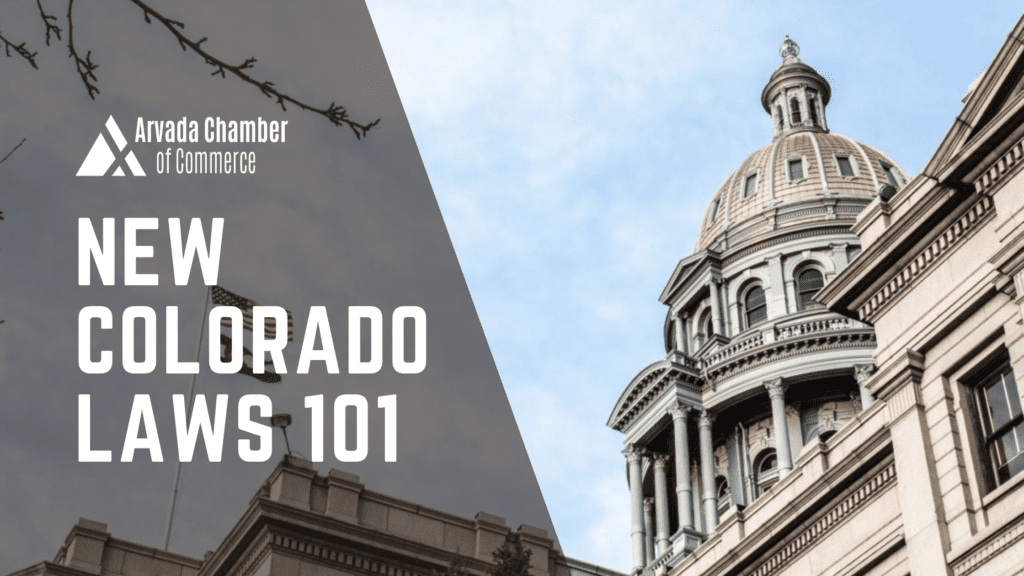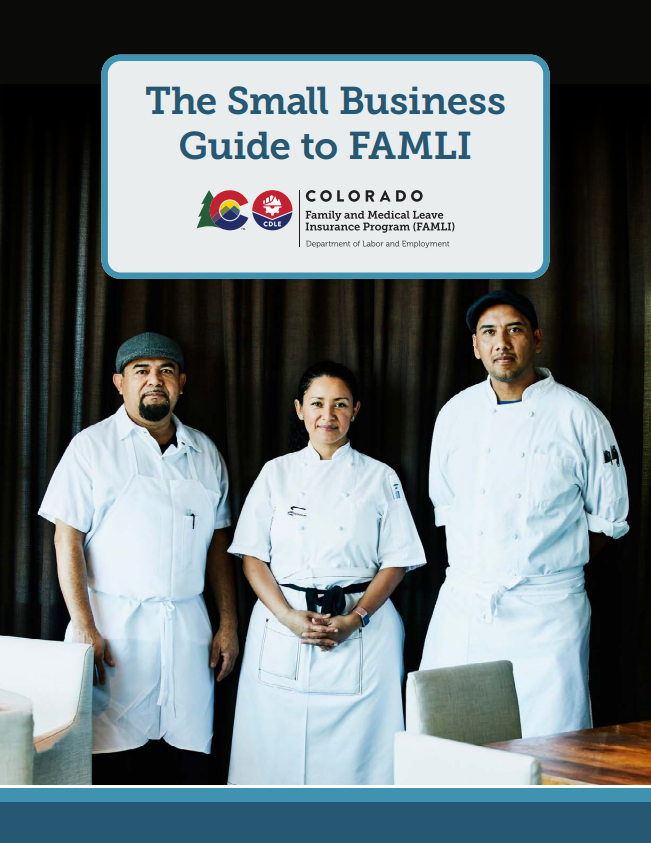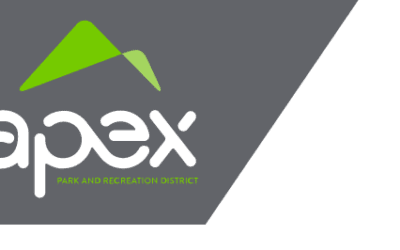The Arvada Chamber has assembled explainer posts for five major Colorado laws that impact businesses in 2024. Read below for this legislation’s eligibility, key dates, and the requirements for businesses.
Colorado Bills 101
- Colorado Family and Medical Leave Insurance Program (FAMLI)
- Colorado’s Minimum Wage Increase
- Plastic Pollution Reduction Act
- Colorado SecureSavings Program
- Colorado Protecting Opportunities and Workers Rights Act (POWR Act)
Colorado Family and Medical Leave Insurance Program (FAMLI)
To ensure that Colorado workers have access to paid leave in circumstances that pull them away from their work, voters in Colorado approved the Family and Medical Leave Insurance Program (FAMLI) in 2020. The state began collecting fees in 2022 for this program that applies to all businesses in Colorado that employ at least one person.
Eligible employees are entitled to up to 12 weeks of paid leave per year in the following cases.
- Care for a new child. New mothers, fathers, or guardians responsible for the care of a child are eligible for FAMLI benefits for up to 12 months after birth, adoption, or foster placement. Parents that experience complications with pregnancy may be eligible for up to 16 weeks of paid leave. A biological relationship is not necessary to qualify for FAMLI, and employers must be given 30-day notice before family leave begins.
- Personal medical leave. Workers may take leave to care for themselves if they have a serious health condition. These could be illnesses or injuries that require inpatient medical care or ongoing medical treatment.
- Care for a family member. Employees may also request leave to care for a family member or loved one that needs care or medical attention.
- Support for family members in the military. Military families in Colorado will be able to access FAMLI benefits in order to support a family member’s deployment or active duty service. Employees might need to request leave to make arrangements for a family member’s deployment or support the responsibilities of an active duty service member while they are deployed.
- Safe leave for domestic violence. Colorado workers have access to FAMLI benefits to attend to their needs if they or a loved one have been the victim of any form of domestic violence or abuse.
Employees may choose to take leave through the FAMLI program in a number of ways. They can take continuous leave, in which they would have up to 12 weeks of uninterrupted leave to attend to any of the circumstances described above. They may also opt for intermittent leave and take time off for shorter periods, returning to work between each period. Finally, workers can choose to work reduced hours or shift to part-time while having the outstanding time covered by the FAMLI program.
Additionally, employees who became parents in 2023 may still be eligible for FAMLI benefits, as they are eligible for up to 12 months after a birth, adoption, or foster care placement. Benefits took effect on January 1st of 2024, so those employees within a year of becoming a parent are still eligible to take advantage of FAMLI benefits.
Who is eligible for FAMLI benefits?
Most workers in Colorado are eligible for FAMLI benefits as of January 1st, 2024, including self-employed workers, contractors, and employees of local government employers that have opted out. Enrollment is optional for self-employed Coloradans or gig workers, but self-employed workers that live and work in Colorado must opt-in to the program and agree to pay premiums for at least three years to be eligible for coverage under the FAMLI program.
Coloradans throughout the workforce become eligible for the FAMLI program after they have earned $2,500 in wages subject to FAMLI premiums over a period of about a year. Additionally, every Colorado employer is required to notify their employees about FAMLI and post the required notice in the workplace.
Only those employees who work in Colorado are eligible for FAMLI benefits. For example, if a company were to employ 25 people, but only 20 of them work in Colorado, the company is only responsible for FAMLI premiums for those 20 employees.
Which businesses are required to participate in FAMLI?
All businesses in Colorado with at least one qualified employee are required to register and participate in the FAMLI program. Business owners who only pay themselves as the sole employee of the business are considered self-employed and are given the option to enroll in the program. According to the language of the FAMLI Act, an employee is defined as:
“Any individual, including a migratory laborer, performing labor or services for the benefit of another, irrespective of whether the common law relationship of master and servant exists.”
Therefore, all businesses, including religious organizations and nonprofits, that employ at least one person are required to register with the FAMLI Division. For further information for small businesses owners, see the Small Business Guide to FAMLI.
Who pays for the FAMLI program?
FAMLI is a social insurance program that is funded by employee and employer premiums paid into a fund.
The premiums for FAMLI may be divided between the employer and employee for companies with 10 or more employees. Premiums are set at 0.9% of the employee’s wage, with at least 0.45% to be paid by the employer and 0.45% to be paid by the employee. The employer may choose to cover the entire cost of the premium as an added benefit to their employee if they choose to do so.
Companies with fewer than 10 employees are not required to pay the employer share of the FAMLI premiums, though they must collect and remit the employee share of the premium.
Companies also have the option to enroll in a private plan that offers benefits that are at least as generous as those offered by the state. The company must apply through the FAMLI division in order to enroll in a private plan to ensure that benefits are comparable to FAMLI and approved by the Division.
In the event that an employee takes leave through the FAMLI program, the employer will not be responsible for their employee’s salary or wages for the duration of their leave. The state will pay the employee at 90% of their average weekly rate, with lower wage earners receiving a higher percentage. Payments are calculated on a sliding scale, with benefits capped at $1,100 per week.
How to register for FAMLI
- For businesses: all businesses in Colorado with at least one qualified employee are required to register with the FAMLI Division. To do so, visit the FAMLI Division website, navigate to the employer tab and register there. Regardless of your business structure, if you have at least one qualified employee you will need to register with the FAMLI Division, submit wage data, and send in premiums on behalf of your employees.
- For individuals: to apply for FAMLI benefits, visit the FAMLI Division, navigate to the My FAMLI+ tab, and submit claims and documents through the My FAMLI+ portal.
FAMLI vs FMLA
Importantly, Colorado’s FAMLI program differs from the federal Family and Medical Leave Act (FMLA). FAMLI is designed to run in conjunction with the federal FMLA program, though there are some important differences to keep in mind.
For one, Colorado’s FAMLI program is paid, while the FMLA program is not. FAMLI offers workers a percentage of their weekly pay in addition to job protection, while FMLA is an unpaid job-protection program. In addition, employees of businesses of any size in Colorado are eligible for FAMLI benefits, while only those employed by companies with more than 50 employees are eligible for FMLA protection. Finally, self-employed workers are able to opt-in for FAMLI benefits, while FMLA protection is only available to employees of covered employers.
Through the B.O.L.D. 2026 initiative, Advocacy KAPS Council, the Jefferson County Business Lobby (JCBL), and consistent outreach to elected officials at all levels of government, the Arvada Chamber strives to stay informed on the latest policy developments while advocating for a strong local economy. Find resources and ways to engage at arvadachamber.org/advocacy.





0 Comments